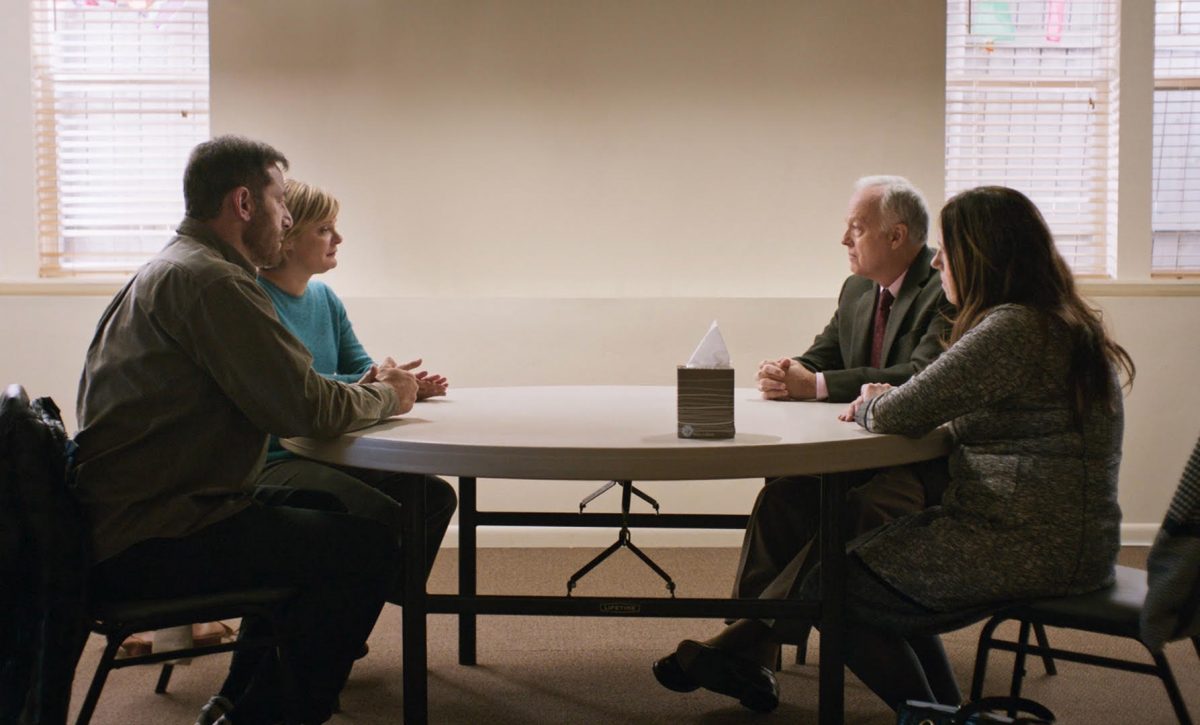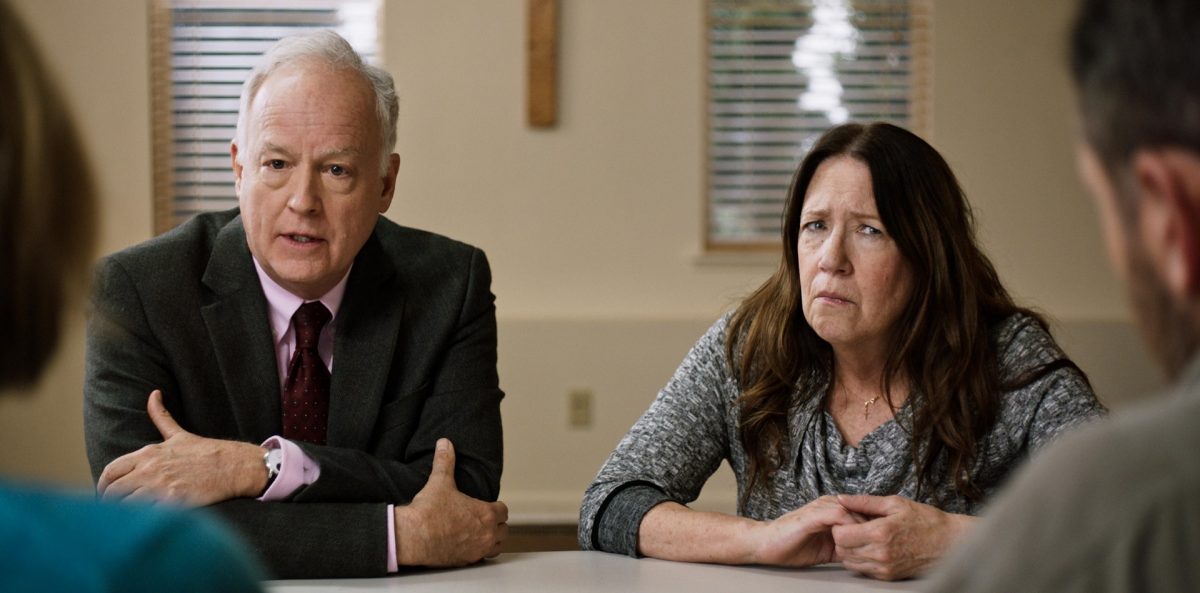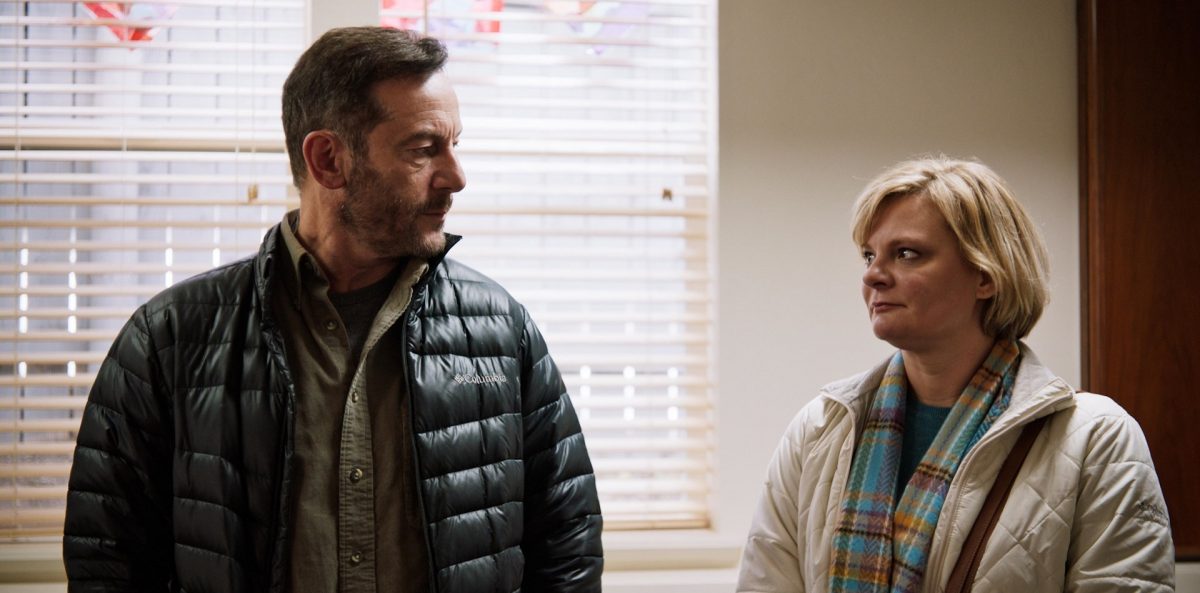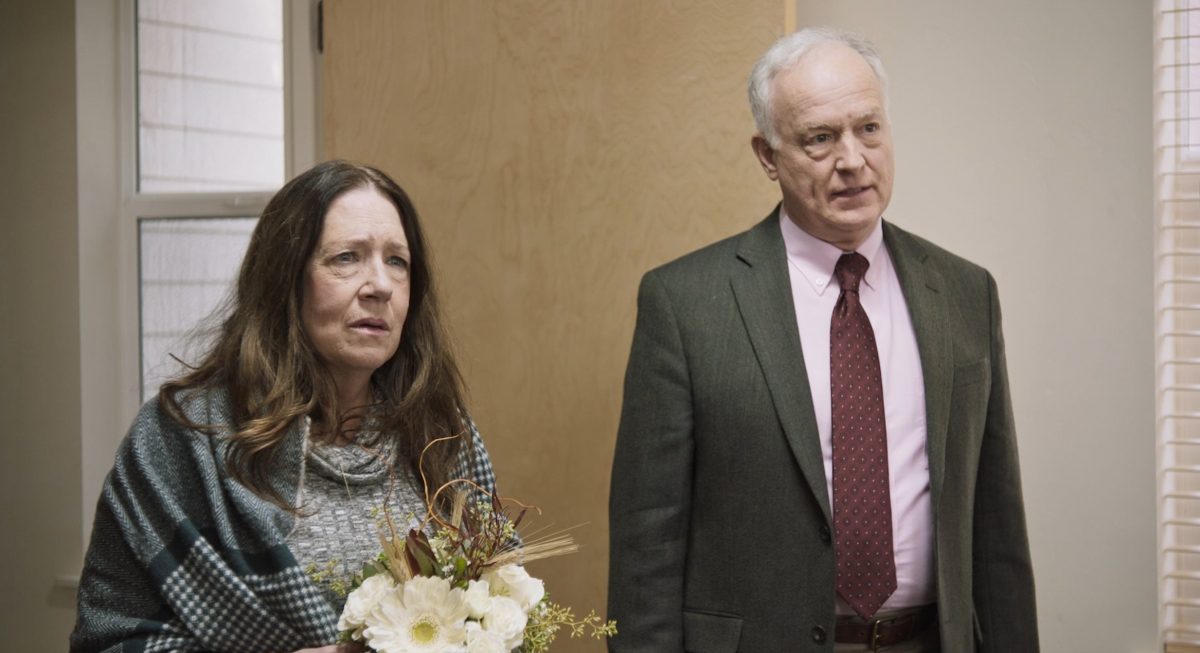Mass may not be high on your radar at the moment among this year’s Fall slate, but it’s definitely one you won’t forget with incredible performances.
On paper, Mass doesn’t seem like the kind of film that’s going to stand out. Hell, it doesn’t even feel like the kind of film I’m normally interested in. The nearly two-hour drama is played out almost entirely as a conversation between four characters, all within the confines of a Church meeting room. Seriously, that’s it.
MASS
Directed By: Fran Kranz
Written By: Fran Kranz
Starring: Reed Birney, Ann Dowd, Jason Isaacs, Martha Plimpton
Release Date: October 29, 2021 (Wide Release)
Parents Jay (Jason Isaacs) and Gail Perry (Martha Plimpton) have come to meet, one-on-one, with the parents who killed their son, Richard (Reed Birney) and Linda (Ann Dowd). The tragedy has, obviously, impacted all of their lives in many ways, but with the court cases long settled, they’re looking for a different kind of reckoning.

Mass plays out as a conversation between them, as they explore both the mundane and deeper parts of the tragedy they all must share. While it features plenty of cuts, it’s shot and edited in a way that feels like it’s one single take/conversation. There’s not time jumps during their talk, and the audience is placed in the role of a voyeur looking in on this moment in their lives.
Again, on paper, it doesn’t sound like a film that should work, or be all the engaging. It’s essentially two hours of four people talking. The ultimate result, however, is a film I couldn’t turn away from. A film where the runtime seemed to breeze by as I was sucked into the story and lives of these characters, and found myself deeply, emotionally, impacted.
It’s hard to pinpoint any one thing that stands out in Mass, and that makes it so compelling. It’s truly a case of the whole being greater than the parts that make it. For one, the story of the tragedy itself is told in an interesting way that keeps pulling you along. I don’t want to go into the specifics here, mostly because a big factor in the enjoyment of the movie is learning exactly what happened.

The film doesn’t show any flashbacks, or cutaways, to the events being discussed. Rather, we’re being told the story through the dialog between all of the parents. It’s impressively handled, and despite not seeing a single frame about the primary event, the picture being painted feels thorough and complete. It’s not just a straight recounting either, as their back-and-forth reveals new slivers of details.
From the outset, there’s a pervasive sense of something being wrong. You know something terrible has happened, but the extent/depth of the event doesn’t come into focus until later. Uncovering that tragedy keeps you hooked on every word. It’s a compelling way to tell a story, that’s not exactly what you’d expect, but is nonetheless effective.
By the time you get the full picture of what happened, there’s a sense of being on the same page as all the parents involved. There’s anger, remorse, a desire for justice, and an overwhelming feeling of not being sure where to go next. You can see all of these emotions play out within the characters, via their stunning performances.

Seriously, as good as the story plays out, none of it would work without the phenomenal skills being demonstrated by the actors. The entire discussion, even in how the events of the tragedy are recounted, has a natural flow to it. Nothing feels forced or placed there simply for the sake of explanation.
The emotion you see play throughout the conversation, runs the gamut and feels genuine. I can’t tell you how many times I found myself choked up alongside one of the characters, or feeling my face flush with the righteous anger they were feeling; even the muted resignation in knowing nothing might change.
It’s a roller coaster. The filmmaking put into Mass helps carry that along, enhancing the emotional beats, as well. For the most part, the film feels shot almost in a documentary style, but there are subtle changes in both the framing and editing that mirror the performances/dialog.
As the conversation begins to get more heated, the camera style becomes more prominently handheld (shaky, though not nauseatingly so), rapidly jumping back and forth between the characters. When the quiet moments come, the breaks in the tension, we see longer shots, pulled back, and giving everyone room to breathe.
It’s a subtle thing, but has a major impact on the pacing and overall storytelling at play. I was impressed with seeing how it was handled, especially considering this is Fran Kranz’s directorial debut.

Between all these elements, we’re left with a film that I haven’t stopped thinking about since I saw it (nearly a month ago). It’s stuck with me in a way few films have, and I’m not ashamed to admit I was disconsolate for a while after the first viewing. I was wrecked, not just as a parent myself, but at the injustice and reality of the situation for too many people.
Initially, the only real complaint I had about the film was its ending. Something about it doesn’t seem to fully click, or isn’t satisfying…But, the more I’ve thought about it, the more I think that’s intentional. I don’t know that there IS a way for this type of story to end satisfactorily.
Mass is an exploration of grief. How people cope with tragedy (on both sides), and the ways in which they seek to move on. While you feel a desire for retribution, or as Isaacs’ character succinctly puts it at one point, you want the other side to feel “regret” or “pain.” But even as you want that hurt, you can’t help but empathize. There’s a knowing that even when that pain comes, it won’t give YOU any relief.
As such, there’s no ending to this story that feels like it would be definitive. Just an ending that feels less bad than any other. In this way, you truly feel the loss, anguish, and presiding sense of being directionless these parents must feel. It’s powerful not only in the story of what happened (which is sadly timely and close to home), but in the way its presented.

